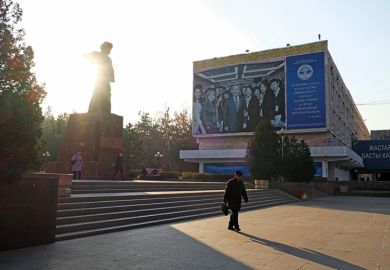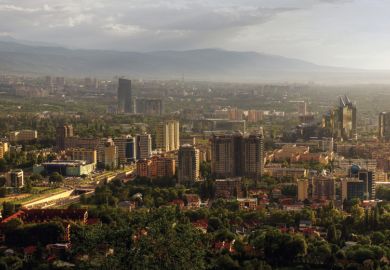The American University in Central Asia has its roots in the independence movements that swept across eastern Europe and Central Asia following the collapse of the Soviet Union. Based in Kyrgyzstan, it was set up in 1993 with a view to educating leaders for the democratic transformation of the region.
However, former president Ellen Hurwitz explained that there were still remnants of the old Soviet system that were difficult to shake off.
“Corruption and bribery: these are the leftovers of Sovietisation that create challenges in the region,” she said. “I found there were very top-down, authoritarian approaches when I arrived.”
Despite AUCA’s idealistic foundation, Professor Hurwitz, who led the university between 2005 and 2010 and is now executive director of its foundation, said that the main focus of her tenure had been challenging these attitudes head-on.
“For me, you have to sit down with people and spend a long time explaining how to fix it, how to work from the bottom up. I spent five and a half years doing it, and by the end I was exhausted,” she said.
“For me leadership is about setting the example and very patiently helping people, nurturing the values that foster transformation. It doesn’t happen if you just say ‘you have to do this’. The problem is that people can be defensive – and also lazy.”
Some might consider that Professor Hurwitz’s gender may have been an additional challenge in a region in which higher education, in her own words, can often feel like an old boys’ club.
Getting more women into senior leadership roles is a priority, Professor Hurwitz said, but she said that many of the problems with higher education in the region have more to do with what she called “old think” than solely gender.
In her opinion, the creation of a university that is more student focused, like AUCA, challenges these attitudes with “inventiveness and new ideas”.
AUCA, based in the Kyrgyz capital Bishkek, was the first university in Central Asia to offer US-accredited degrees in liberal arts programmes through a partnership with New York’s Bard College, and now offers 14 undergraduate majors and four postgraduate programmes.
Professor Hurwitz – the former president of two US liberal arts colleges, Albright College and New England College – said that there are stark differences between higher education sectors in North America and Central Asia. Nevertheless, there are lessons that could be transferred. She said that the problem globally is that there is currently a lot of discussion about how to make universities more student-centred but not a lot of practical ideas.
“To really succeed in learning, you have to respect from the bottom up – it is so important to focus on the students,” she said. “[Student learning is] the fundamental point of university. The American liberal arts ideal does this – although that doesn’t mean to say it’s always practising it – and that’s how we need to centre plans for our universities of the future.”
Nevertheless, Professor Hurwitz emphasised the importance of taking account of local circumstances when setting up a new university, and not just imposing a foreign model – in this case, an American one.
“You can’t just come in and expect to be imperialists in higher education; you’re not the British empire or an American one, you have to collaborate,” she said.
POSTSCRIPT:
Print headline: Americans abroad take on Soviet corruption
Register to continue
Why register?
- Registration is free and only takes a moment
- Once registered, you can read 3 articles a month
- Sign up for our newsletter
Subscribe
Or subscribe for unlimited access to:
- Unlimited access to news, views, insights & reviews
- Digital editions
- Digital access to THE’s university and college rankings analysis
Already registered or a current subscriber?








